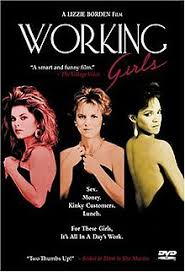
Ilmestymisvuonnaan 1986 Working Girls nostatti äläkkää. Ei ihmekään: Borden teki elokuvansa vastalauseena äänekkäälle suuntaukselle, jossa prostituutio nähtiin pelkästään puoli-institutionaalisena väkivaltana ja naiset uhreina. Tässä elokuvassa on toisin: Molly, Dawn ja muut manhattanilaisen luksusbordellin palveluntarjoajat ovat älykkäitä, koulutettuja ja hyvin selvillä tekemisistään. Päivittäinen seksi vieraiden ihmisten kanssa on usein tylsää, joskus hauskaa, ja täynnä niin iloisia kuin ikäviäkin yllätyksiä – ei sen pahempaa tai parempaa kuin mikään muukaan työ, ja jos Undine de Rivièreä on uskominen, tämä on tavallinen tilanne. Kolme vuosikymmentä myöhemmin elokuva on edelleen ajankohtainen, erityisesti silloin kun aiheeksi nousee solidaarisuus työpaikalla. Elokuvan alkuperäinen jakelija Yhdysvalloissa oli muuten Harvey Weinsteinin Miramax – siinä teille ironiaa…
—
Back in ’86 when Lizzie Borden’s now crypto-canonical masterpiece hit the screens, people fought over Working Girls. Not surprisingly: Borden had made it in defiance of one particularly vociferous stream of feminism who saw prostitution as nothing but semi-institutionalized abuse, with the women being presented as helpless and hapless victims. Not here: Molly, Dawn and the other ladies offering their services at an upscale Manhattan bordello are intelligent, educated, very much in control of what they’re doing and why. Doing it with strangers on a more or less daily basis here is at times boring, sometimes hilarious, full of surprises bad and good – in all: neither better nor worse than any other job; if Undine de Rivière is to be trusted, this is the norm… Almost three decades later, the film has lost nothing of its punch and still feels timely, especially when workplace solidarity comes up. By the way: Working Girls’ original US distributor was Miramax, the company of Harvey Weinstein… oh, irony!






